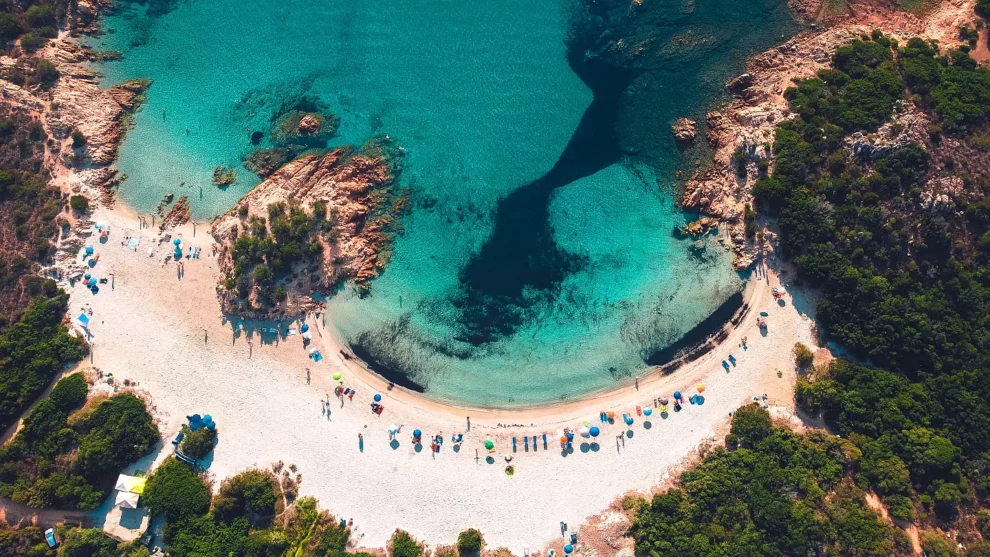Sardinia has capped the number of holidaymakers that can visit its famous beaches this summer.
The Italian island of Sardinia is protecting its spectacular beaches from overtourism with multiple new restrictions including fines of up to €3,500.
The island’s coastline is renowned for its pristine stretches of sand, including its famed pink beach.
But its seaside has also been suffering due to disrespectful visitor behaviour and overcrowding.
To safeguard the coastline, the island has capped visitor numbers and introduced fees at some of its most popular beaches.
Spiaggia Rosa: €3,500 for stealing sand
Lying off the west coast of Italy, Sardinia has some of the most beautiful beaches in the country. The island is frequently voted as one of the top places in Italy for a seaside holiday.
about:blank
But the popularity of the island’s coastline has begun to cause problems. This summer, several new regulations and limitations have been introduced on the island’s beaches to protect the natural environment.
The Spiaggia Rosa, located on the outlying Budelli island, draws thousands of tourists a day in summer to admire its magnificent pink sand. But visitors can only see the picturesque sands from a distance on a boat.
Because of the beach’s fame, it has been closed off to visitors since the mid-1990s after its coveted sand began to disappear. The local government took action after tourists were found to be smuggling kilos worth away as souvenirs.
This year, local authorities have announced that walking on the beach will land you a €500 fine while anyone caught stealing the sand will have to pay up to €3,500.
La Maddalena, Cala Coticcio and Cala Brigantina are capping visitor numbers
In the archipelago of La Maddalena two beaches now have restricted access. Last year, only 60 people a day could visit Cala Coticcio and Cala Brigantina over the summer.
Travellers needed to book their slot online and pay €3 per person to access the beaches with a guide.
The visitor limit and access fee has not yet been announced this year, but visits will likely need to be booked by contacting a local guide directly like last year.
Several other beaches around the island now only allow access to a limited number of visitors. In the north, Cala Brandinchi and Lu Impostu will limit numbers to 1,447 and 3,352 respectively between June 15 and September 15. At Cala Mariolu, 700 people are allowed per day.
In Villasimius in the southeast, beachgoers heading to Punta Molentis, Riu Trottu and Portu Sa Ruxi are required to pay to access the car park. Each vehicle costs €10 with an additional €1 for each passenger. Cyclists and pedestrians pay €3.
Staff are stationed at car parks and beach access points to check tickets.
Beach towels banned on Pelosa beach
On the west coast, Stintino’s famed Pelosa beach is now only open to a limited number of visitors per day. A maximum of 1,500 people are allowed to access the beach daily. Last year, visitor numbers reached as many as 4,000 on some days.
Those looking to sunbathe on Pelosa beach need to book a ticket costing €3.50. Regulations also state that visitors should bring mats instead of beach towels, which trap less sand.
Ogliastra: Time limits for beachgoers
In Ogliastra on the east coast, 300 people a day are permitted on Cala Birìala and beachgoers who arrive by boat can only stay for 90 minutes.
Similarly, visitors to Cala dei Gabbiani are also capped at 300. Last year, vistors had to leave after two hours.
How is Italy clamping down on overtourism?
Sardinia joins several other popular tourist destinations that have introduced restrictions as a result of overcrowding.
Venice is still mulling a booking system and fee to visit the city. In the Italian Riviera town of Portofino, tourists lingering too long and blocking streets face fines of €270.
Source: Euro News















